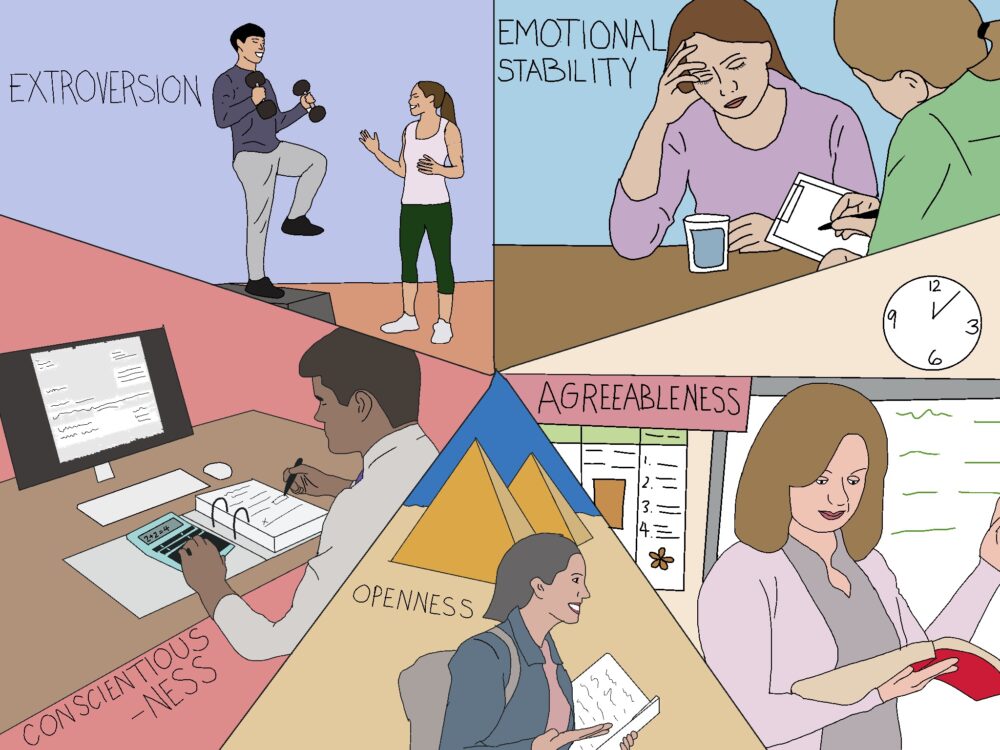
By Brandon Nguyen
Choosing a lifelong career is an upcoming decision for many students. Students have to consider many factors that may affect the rest of their lives, such as How much free time will I have? Is the job enjoyable? How much money will I make?
Stressing over the uncertainty of the future often results in “analysis paralysis,” where students procrastinate on making crucial decisions. By first reflecting upon themselves, students are often able to cut through their hesitation and make a choice, such as which career they see fit for themselves.
Psychologists have developed the big five dimensions of personality, also known as the Big Five, over the years. Knowing your applicable traits will help you decide your path.
Conscientiousness
Conscientiousness is how much self-control a person has when trying to achieve goals, especially long term ones. If someone is responsible and self-critical, then they are probably high in conscientiousness.
People of this type prefer to sacrifice the present for long term achievements. Conscientiousness is the best predictor of success second only to intelligence. This is because people with conscientiousness long for achievement. They are skillful in setting goals and organizing, preferring jobs that can be methodically planned and have little risk.
The downside to fitting in this personality trait is that one must always have a sense of duty. In the scenario that a conscientious person loses their job, their natural tendency to criticize themselves would take a heavy toll on their self-esteem.
Some careers for conscientious people include top executives, fundraisers, sales managers and lawyers. Such jobs require hard-work, self-discipline, commitment and responsibility.
Agreeableness
The second personality trait is agreeableness, which is being empathetic, compassionate and compliant. If one is sensitive to the needs of others, cooperative and altruistic, then they most likely possess the qualities of an agreeable person.
In the workplace, agreeable people often have trouble being assertive enough to get the salaries they want. If you find yourself behaving timidly when approaching a superior, it might also be a sign of agreeableness.
Another sign of agreeableness is that agreeable people may correlate their purpose in the lives of those they have close relationships with their feelings of worth. Whether that be with friends, partners, family or pets, they have to form bonds and feel obligated to improve the lives of those around them.
Fitting jobs for agreeable people include nursing, mental health counseling, teaching and human resources. Agreeable people may have an interest in these careers because they’re caring and uplifting by nature.
Extroversion
The third personality trait is extroversion, which is how social and outgoing a person is. You may possess this trait if you are sociable, constantly seeking excitement and enjoy being at the center of attention.
Jobs that extroverts would like often involve frequent social interaction, such as being a sales representative, event planner, flight attendant and physical therapist.
A sales representative and event planner are both jobs that would require much forethought as well as interaction with a client. Being a flight attendant and physical therapist are careers that are subject to the constant presence of others, and also being in charge and, thus, at the center of attention.
Neuroticism
The fourth big personality trait is neuroticism, defined as how often one perceives things as negative. If you’re prone to anxiety, depression, worry and self-doubt, you most likely exhibit some form of neuroticism.
Unfortunately, people high in neuroticism are usually poor problem solvers because they often suffer from higher rates of mental illness and lower rates of relationship satisfaction. They see the world as unsafe and therefore constantly try to screen the area around them for any potential threat.
Thus, an important factor for success with people high in neuroticism is communication and support.
Some career options for neurotic people include writers, artists, florists and yoga instructors. These jobs are stable and completely under one’s control. Florists and yoga instructors are great options, for example, because these jobs don’t cause much pressure and become very comfortable once settled into.
Openness
The fifth and last personality trait of the Big Five is openness, or how willing one is to try new things. People with high levels of openness tend to seek out experiences from a variety of interests and like to integrate unfamiliarity into their lives, such as by trying new foods and riding the scariest roller coasters.
A potential disadvantage for people who are open is that they may become a jack of all trades when most employers are looking for a person who specializes in one area. People high in openness may have to suppress their creativity in order to hold down a job.
Fortunately, many companies require innovation and creativity to expand, and we’ve seen evidence of that in companies trying to handle the current global pandemic.
Careers for this personality include travel writers or pilots. Curiosity makes people of this type suitable for traveling all around the world as they take in new cultures and customs.
With all of this in mind, one will able to analyze themselves and decide with more ease where they’d like to end up in their futures. It’s not a light matter, and as high school students, it is critical for our futures that we understand ourselves well before we choose a lifelong path and forge ahead.





